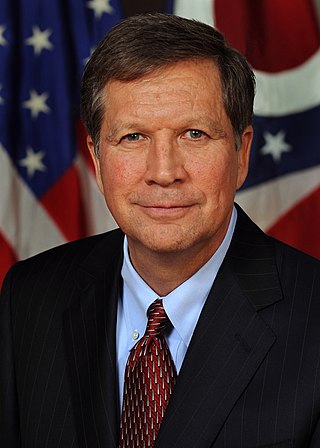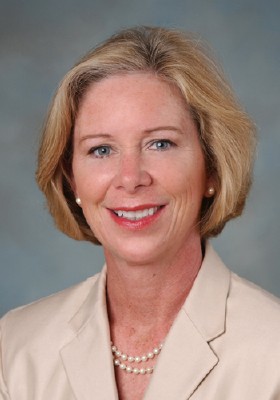Related Research Articles

The availability of legally recognized same-sex marriage in the United States expanded from one state (Massachusetts) in 2004 to all fifty states in 2015 through various court rulings,state legislation,and direct popular votes. States each have separate marriage laws,which must adhere to rulings by the Supreme Court of the United States that recognize marriage as a fundamental right guaranteed by both the Due Process Clause and the Equal Protection Clause of the Fourteenth Amendment to the United States Constitution,as first established in the 1967 landmark civil rights case of Loving v. Virginia.

John Richard Kasich Jr. is an American politician,author,and television news host who served in the U.S. House of Representatives from 1983 to 2001 and as the 69th governor of Ohio from 2011 to 2019. A Republican,Kasich unsuccessfully sought his party's presidential nomination in 2000 and 2016.

Prior to the Supreme Court's decision in Obergefell v. Hodges (2015),U.S. state constitutional amendments banning same-sex unions of several different types passed,banning legal recognition of same-sex unions in U.S. state constitutions,referred to by proponents as "defense of marriage amendments" or "marriage protection amendments." These state amendments are different from the proposed Federal Marriage Amendment,which would ban same-sex marriage in every U.S. state,and Section 2 of the Defense of Marriage Act,more commonly known as DOMA,which allowed the states not to recognize same-sex marriages from other states. The amendments define marriage as a union between one man and one woman and prevent civil unions or same-sex marriages from being legalized,though some of the amendments bar only the latter. The Obergefell decision in June 2015 invalidated these state constitutional amendments insofar as they prevented same-sex couples from marrying,even though the actual text of these amendments remain written into the state constitutions.

Deborah Louise Cook is an inactive Senior United States circuit judge of the United States Court of Appeals for the Sixth Circuit,based in Akron,Ohio.

Jeffrey Stuart Sutton is an American lawyer and jurist serving as the chief circuit judge of the U.S. Court of Appeals for the Sixth Circuit.
Sexual orientation discrimination is discrimination based on sexual orientation and/or sexual behaviour.
Same-sex unions in the United States are available in various forms in all states and territories,except American Samoa. All states have legal same-sex marriage,while others have the options of civil unions,domestic partnerships,or reciprocal beneficiary relationships. The federal government only recognizes marriage and no other legal union for same-sex couples.

Lesbian,gay,bisexual,and transgender (LGBT) persons in the U.S. state of Ohio have most of the rights as non-LGBT residents. Same-sex sexual activity is legal in Ohio,and same-sex marriage has been legally recognized since June 2015 as a result of Obergefell v. Hodges. Ohio statutes do not address discrimination on account of sexual orientation and gender identity;however,the U.S. Supreme Court's ruling in Bostock v. Clayton County established that employment discrimination against LGBT people is illegal in 2020. In addition,a number of Ohio cities have passed anti-discrimination ordinances providing protections in housing and public accommodations. Conversion therapy is also banned in a number of cities. In December 2020,a federal judge invalidated a law banning sex changes on an individual's birth certificate within Ohio.
Same-sex marriage in Ohio has been legal since the U.S. Supreme Court ruling in Obergefell v. Hodges,a landmark decision in which the court struck down Ohio's statutory and constitutional bans on same-sex marriage on June 26,2015. The case was named after plaintiff Jim Obergefell,who sued the state of Ohio after officials refused to recognize his marriage on the death certificate of his husband. Same-sex marriages were performed in Ohio beginning shortly after the Supreme Court released its ruling,as local officials implemented the order.
John J. Bursch was the 10th Michigan Solicitor General. He was appointed by Michigan Attorney General Bill Schuette on February 28,2011. Prior to being Michigan Solicitor General,Bursch served as chair of the Appellate Practice and Public-Affairs Litigation Groups at Warner Norcross &Judd. Bursch argued in more than 6% of all the cases the U.S. Supreme Court heard during his tenure as solicitor general. Bursch returned to private practice at Warner Norcross &Judd in December 2013,and founded his own law firm in 2016,Bursch Law.

This article addresses the history of gay men in the United States. Unless otherwise noted,the members of same-sex male couples discussed here are not known to be gay,but they are mentioned as part of discussing the practice of male homosexuality—that is,same-sex male sexual and romantic behavior.
Same-sex marriage in Texas has been legal since the U.S. Supreme Court's ruling in Obergefell v. Hodges on June 26,2015. Previously,the U.S. state of Texas had banned same-sex marriage both by statute and in its State Constitution. On February 26,2014,Judge Orlando Luis Garcia of the U.S. District Court for the Western District of Texas found that Texas's ban on same-sex marriages was unconstitutional. On April 22,2014,a state court came to the same conclusion. Both cases were appealed. The district court's decision was appealed to the Fifth Circuit Court of Appeals,but before that court could issue a ruling,the U.S. Supreme Court struck down all same-sex marriage bans in the United States in Obergefell on June 26,2015. Within a few months of the court ruling,all counties had started issuing marriage licenses to same-sex couples,except for Irion County,which announced in 2020 that it would begin issuing licenses to same-sex couples,making it the last county in the United States to comply.
Same-sex marriage in Tennessee has been legal since the U.S. Supreme Court ruling in Obergefell v. Hodges on June 26,2015. Governor Bill Haslam quickly announced that the state would abide by the court's decision,and same-sex couples began to marry in Tennessee. Previously,Tennessee had banned same-sex marriage both by statute and its State Constitution.

In the U.S. Virgin Islands,Lesbian,gay,bisexual,and transgender (LGBT) people face certain legal challenges and discrimination not faced by non-LGBT people. Same-sex sexual activity has been legal since 1985,but the Virgin Islands provides no protection against discrimination for LGBT residents. Following the Supreme Court's ruling in Obergefell v. Hodges on June 26,2015,which found the denial of marriage rights to same-sex couples unconstitutional,same-sex marriage became legal in the islands.
Same-sex marriage in the Northern Mariana Islands was legalized by the U.S. Supreme Court's landmark ruling in Obergefell v. Hodges on June 26,2015,which struck down same-sex marriage bans nationwide. On June 29,Governor Eloy Inos issued a statement hailing the decision as "historic",and said he would work with the Attorney General and local officials in the Northern Mariana Islands to bring the U.S. territory into compliance. Attorney General Edward Manibusan issued a memorandum on June 30 confirming that the territory was bound by the court decision and said that marriage license forms would be changed to include same-sex couples.

Same-sex marriage in the United States Virgin Islands has been legal since July 9,2015,as a result of the U.S. Supreme Court's decision in Obergefell v. Hodges. On June 26,2015,the Supreme Court ruled that same-sex couples have a constitutional right to marry under the Equal Protection and Due Process clauses of the Fourteenth Amendment,legalizing same-sex marriage in the U.S. Virgin Islands. On June 30,Governor Kenneth Mapp said the territorial government would comply with the ruling,and on July 9 he signed an executive order that requires the territory's government to extend marriage rights to same-sex couples. The first marriage licenses were granted on July 21,2015,after the first same-sex couples to apply for licenses did so on July 13,beginning the 8-day waiting period between applying for and receiving marriage licenses.
Obergefell v. Hodges,576 U.S. 644 (2015),is a landmark LGBT rights case in which the Supreme Court of the United States ruled that the fundamental right to marry is guaranteed to same-sex couples by both the Due Process Clause and the Equal Protection Clause of the Fourteenth Amendment of the Constitution. The 5–4 ruling requires all fifty states,the District of Columbia,and the Insular Areas to perform and recognize the marriages of same-sex couples on the same terms and conditions as the marriages of opposite-sex couples,with all the accompanying rights and responsibilities. Prior to Obergefell,same-sex marriage had already been established by statute,court ruling,or voter initiative in thirty-six states,the District of Columbia,and Guam.
Same-sex marriage in Georgia has been legal since the U.S. Supreme Court's ruling in Obergefell v. Hodges on June 26,2015. Attorney General Sam Olens said that Georgia would "adhere to the ruling of the Court",and the first couple married just minutes after the ruling was handed down. Previously,Georgia had banned same-sex marriage both by statute and its State Constitution.

Alphonse A. Gerhardstein is a civil rights attorney in Ohio who has been litigating since 1976. While he is best known nationally as lead counsel for James Obergefell in the Supreme Court's same-sex marriage decision Obergefell v. Hodges,he has been an advocate on behalf of prisoners,victims of police misconduct and women seeking reproductive freedom throughout his career,in addition to LGBTQ causes like same-sex marriage. He has recovered millions of dollars and secured substantial reforms for victims of official misconduct. He is also the founder of the Ohio Justice and Policy Center,a nonprofit agency that advocates and litigates for criminal justice reform.

Jim Obergefell is an American civil rights activist who was the lead plaintiff in the 2015 U.S. Supreme Court case Obergefell v. Hodges,which legalized same-sex marriage throughout the United States. Obergefell had sued the state of Ohio in 2013,due to that state's lack of legal recognition of Obergefell's marriage to his husband,John Arthur. Obergefell was the Democratic nominee for the 89th legislative district of the Ohio House of Representatives in the 2022 elections.
References
- ↑ Patch, David (2011-11-03). "Ex-lawmaker from Delta to lead Ohio Turnpike: Board hires Hodges as executive director". The Toledo Blade . Toledo, Ohio. Retrieved 2015-06-29.
- 1 2 "Ohio Health Department Chief Rick Hodges Resigns". 20 March 2017. Retrieved April 15, 2018.
- 1 2 Vitale, Bob (November 1, 2019). "Obergefell and Hodges: The Accidental Opponents". Columbus Monthly. Archived from the original on November 3, 2019. Retrieved 18 July 2020.
- ↑ "Resolution Honoring the Distinguished Service of Executive Director, Richard A. Hodges" (August 18, 2014). Ohio Turnpike and Infrastructure Commission. 2014 Commission Resolutions, #50-2014. Retrieved 2015-04-26.
- ↑ "Richard Hodges, MPA, Director, Ohio Department of Health Archived 2015-06-27 at the Wayback Machine " (August 11, 2014). Ohio Department of Health. Retrieved 2015-04-26.
- ↑ "Supreme Court strikes down bans on same-sex marriage".
- ↑ Hodges, Richard. "Ohio Department of Health Home". www.odh.ohio.gov. Retrieved 2017-01-09.
- ↑ Sigoff, Mike (February 12, 2020). "Opponents in Groundbreak Same-Sex Marriage Case to Speak at UT". Toledo Blade. Retrieved 18 July 2020.
- ↑ "Rick Hodges Joins College of Health Sciences and Professions". Ohio University College of Health Sciences and Professions. Ohio University. August 23, 2017. Retrieved 18 July 2020.